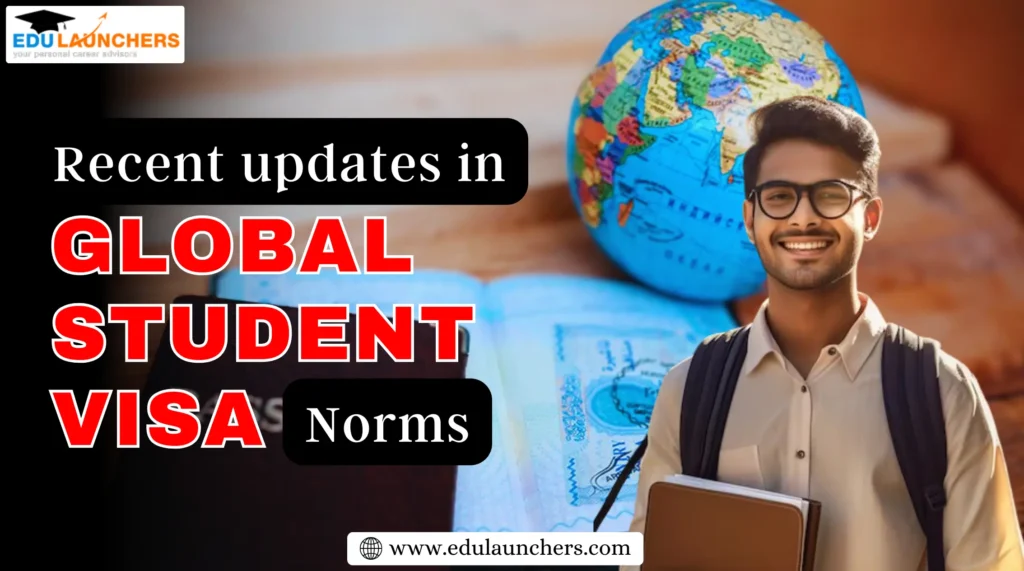Introduction
The landscape of student visas is changing globally. Universities worldwide are witnessing a surge in the applications, leading to longer processing times. The students also have a variety of options to study abroad. So, the universities globally are ramping up and increasing their offerings to attract maximum talents.

While some countries like Japan are easing the admission into the nation, US announces 30% increase for student visa interviews, Meanwhile, the UK faces legal challenges over its English language test accusations and implements stricter policies surrounding dependents and financial requirements for some student visa holders. Go through the article to dive into the intricate details of study visa regulations from around the world.
Japan Allows Admission Through ID Cards:
In the recent times, Japan is emerging as amicable host for international students.
Moving forward with the same thought, the Japanese government has relaxed visa requirements for Indian students. The interested Indians would only need to present their student ID card instead of the usual financial documents to obtain a study visa. This has significantly simplified the process for Indian students looking to study in Japan.
The same was confirmed by the Japanese Ambassador to India, Hiroshi F Suzuki, in an interview. He projected streamlined visa process as a way to encourage Indian students to study and work in Japan.
To combat the aging population, Japan is highly emphasizing on attracting skills professionals through specialized programs like Specific Skilled Worker (SSW) Visa. The aim is to bolster economic growth and address labor shortages in the country.
France Extended Post-Study Work Visas:
Master’s degree graduates can now apply for a five-year post-study work visa, which is extended from previous two years cap.Apart from this, students who have completed at least one semester of their master’s program in France can now apply for a five-year short-stay ‘Schengen visa’. The visa allows for seamless job hunt in other European countries.
US Ramps up Interview Slots for International Students:
In the past year, the United States processed a record-number of student visas from India- 140,000 Indian student visas. However, this also translated to higher processing time- often exceeding to over an year.
So, addressing the backlog, US have increased the interview slots for Indian students by 30% to reduce the wait time to less than 250 days.
Apart from this, US department of state has also implemented a waiver for returning students who have already held US visa previously and have strong ties to their home country. The program has been implemented in January 2024.
The interview process remains same for first time applicants and other categories of US visa applications.
Canada Revised Post-Graduation Work Permit Program (PGWP):
At the dawn of New Year, country announced to cap the number of international students immigrating to Canada for the next two years. The change would decrease the student visa approvals by 35% from past year.
Now, the government also aims to strengthen the public institutions and elevate the quality of education imparted to international students. To do so, the government has announced to make changes in its PGWC program.
Starting 15th February 2024, the students with 2-years of master’s degree are eligible for 3-year post-Graduation Work Permit program in case candidate meets other eligibility needs.
PGWP is an open work permit which does not bind students to particular firm or employer. This allows graduates to work for different organizations and explore different career options. The longer PGWP validity (especially for shorter master’s degrees) grants graduates more time to secure Canadian work experience, which in turn increases their chances of securing Canadian Citizenship.
However, from September 1, 2024, graduates of programs offered through PPP colleges will no longer be eligible for the PGWP. PPP colleges (Public-Private Partnerships colleges) are private colleges which, through curriculum license arrangement, teach public college’s curriculum in their institutes.
As per the latest announcement bb Marc Miller, Minister of Immigration, Refugees and Citizenship of Canada (IRCC), private college students will no longer benefit from PGWP.
Apart from this, the country is also planning to restrict eligibility for open work permit for Spouses and Common Law partners of Study visa holder. The plan is to limit the open work permit eligibility to only spouses/common-law partners of master’s and doctoral students. Students in professional programs like medicine and law will also be eligible for open work permits.
Conclusion:
The international study ecosystem is changing due to variable regulations, fierce competition and changing governmental policies. As a result, universities are vying for international talent to attract diverse applicant pool. This increased competition also coincides with shifting government policies across
various countries. They are diversifying their offerings and limiting the restrictions for international students.
Students, hence, are presented with diversified opportunities and learning experiences across the globe. However, amid massive pool of opportunities, students must also be careful to conduct their preliminary research and stay updated about the policy changes.
Students are also advised to regularly monitor the latest visa regulations of their chosen destination country through official government websites.
*READ MORE: MBA in the USA: Courses, Eligibility, Fees





